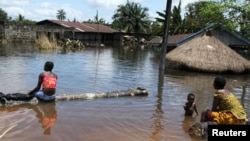The floods have started to recede in Nigeria, however, millions of people across 14 states have been affected. More than 350 people are reported dead. The U.N. and the Nigerian government are launching a new effort to share information and support relief efforts.
Flooding is common in Nigeria during the rainy season. However, this year, much heavier than normal rains overwhelmed drainage systems and dams, triggering floods. Some of the hardest hit states are along the Niger River – a major waterway in West Africa – and its main tributary, the Benue River. Cameroon was forced to release water from its dams on the Benue to relieve pressure. But that in turn contributed to Nigeria’s problems.
U.N. and Nigerian officials say many homes, schools, health centers, roads and bridges have been destroyed. What’s more, a scientist at the Society for Mosquito Control is warning of possible outbreaks of mosquito-borne diseases. He says when floods recede, mosquitoes move in to lay eggs.
In the capital, Abuja, Remi Dourlot, spokesman for OCHA, the U.N. Office for the Coordination of Humanitarian Affairs, said the situation is improving now that the rains have stopped.
“The floods have receded, especially from the upstream states, and they are slowing, receding also from the downstream states now. But it remains that more than 7.7 million were affected by the floods since they started in July. More than two million people have been at some point displaced from their homes,” he said.
Although the displaced have started to return, many may need humanitarian aid because they no longer have homes. Many farmers have also lost their harvests.
To deal with the emergency, OCHA and the National Emergency Management Agency of Nigeria are launching the Nigeria Humanitarian Forum on Flood Response. Dourlot said the forum will help coordinate the efforts of the government, U.N. and humanitarian agencies.
“So we have to gather all the information provided by these various agencies to have a good idea of the current response; also to check whether there are gaps in the response,” he said.
So far, the Nigerian government has spent about $110-million dollars. It’s unclear how much money individual states have spent on the floods, or how much money will be needed in the future.
The death toll has been holding steady, but Dourlot says after the waters recede more victims may be found.
Flooding is common in Nigeria during the rainy season. However, this year, much heavier than normal rains overwhelmed drainage systems and dams, triggering floods. Some of the hardest hit states are along the Niger River – a major waterway in West Africa – and its main tributary, the Benue River. Cameroon was forced to release water from its dams on the Benue to relieve pressure. But that in turn contributed to Nigeria’s problems.
U.N. and Nigerian officials say many homes, schools, health centers, roads and bridges have been destroyed. What’s more, a scientist at the Society for Mosquito Control is warning of possible outbreaks of mosquito-borne diseases. He says when floods recede, mosquitoes move in to lay eggs.
In the capital, Abuja, Remi Dourlot, spokesman for OCHA, the U.N. Office for the Coordination of Humanitarian Affairs, said the situation is improving now that the rains have stopped.
“The floods have receded, especially from the upstream states, and they are slowing, receding also from the downstream states now. But it remains that more than 7.7 million were affected by the floods since they started in July. More than two million people have been at some point displaced from their homes,” he said.
Although the displaced have started to return, many may need humanitarian aid because they no longer have homes. Many farmers have also lost their harvests.
To deal with the emergency, OCHA and the National Emergency Management Agency of Nigeria are launching the Nigeria Humanitarian Forum on Flood Response. Dourlot said the forum will help coordinate the efforts of the government, U.N. and humanitarian agencies.
“So we have to gather all the information provided by these various agencies to have a good idea of the current response; also to check whether there are gaps in the response,” he said.
So far, the Nigerian government has spent about $110-million dollars. It’s unclear how much money individual states have spent on the floods, or how much money will be needed in the future.
The death toll has been holding steady, but Dourlot says after the waters recede more victims may be found.




